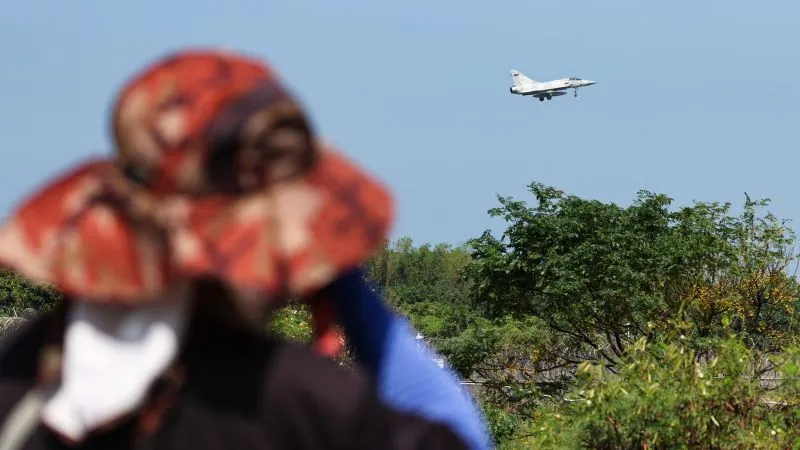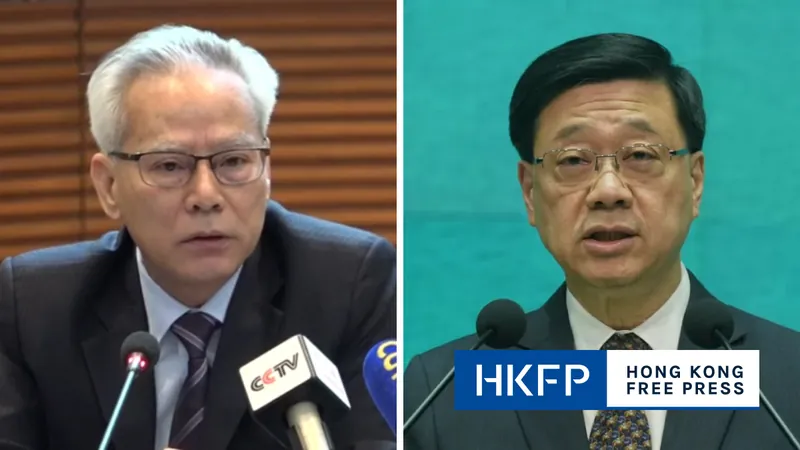
Tensions Rise as Taiwan Condemns Chinese Military Drills as 'Unreasonable Provocation'
2024-10-14
Author: Lok
Taiwan's Strong Condemnation
Taiwan has issued a strong condemnation of China's recent military exercises conducted around the island, labeling them an "unreasonable provocation." The Chinese government claimed these drills are a "stern warning" to forces advocating for Taiwan's independence.
Details of the Military Drills
The Chinese Eastern Theater Command announced that these military activities, which include coordinated operations of the army, navy, air force, and missile units, are taking place in the Taiwan Strait—a critical waterway that separates Taiwan from mainland China—and encompass areas surrounding the island itself.
Increasing Frequency of Exercises
In recent years, Chinese military drills around Taiwan have surged in frequency, typically coinciding with events perceived as provocative by Beijing. Notably, in August 2022, military exercises erupted following the visit of former U.S. House Speaker Nancy Pelosi to Taiwan. Similarly, in May, China conducted drills after the inauguration of Taiwan's President Lai Ching-te, whom Beijing has labeled as a "dangerous separatist." The latest round of drills is codenamed "Joint Sword-2024B," suggesting a continuation of the military maneuvers seen five months earlier.
Taiwan's Response
Ahead of the exercises, the Eastern Theater Command shared a propaganda video depicting a show of military might, including fighter jets and warships, asserting their readiness for battle at a moment’s notice. In response, Taiwan's Defense Ministry declared its strong disapproval of the drills, emphasizing that it has mobilized its own military forces in the face of the escalating tensions.
Call for Restraint
Taiwan's presidential office also urged China to halt its military provocations, which they argue threaten regional stability. President Lai assures citizens that the government remains committed to defending Taiwan's democratic ideals and national security against external threats.
Lai's National Day Speech
These exercises coincide with a notable speech by President Lai on Taiwan’s National Day, where he declared that Taiwan "is not subordinate" to China and emphasized the island's status as a "sovereign and independent country." Lai has long advocated for Taiwan's autonomy, facing significant backlash from Beijing for his position.
China's Objectives and Aggressive Stance
Despite never having governed Taiwan, the Chinese Communist Party maintains a strong objective to "reunify" with the self-governing island, often threatening military action to achieve this goal. The tension has escalated under the leadership of Xi Jinping, who has taken a more aggressive stance regarding Taiwan, raising fears of potential military confrontation.
PLA's Military Activities
The People's Liberation Army (PLA) stated that the exercises commenced with military vessels and aircraft positioning themselves closely to Taiwan from various directions. The focus of the drills was described as preparing for combat readiness in air and maritime domains and conducting joint operations that might include a blockade of key ports and facilities.
Live-Fire Drills and Geographic Scope
While the PLA has not confirmed whether live-fire drills were conducted this time, past military exercises did involve missile launches. The drills were geographically expansive, covering nine areas around Taiwan and its nearby islands, reinforcing China's presence and intimidation in the region.
Gray Zone Tactics
Adding to the complexities, Taiwan's defense forces detected multiple incursions by Chinese aircraft, including planes crossing the informal median line in the Taiwan Strait—a boundary China does not acknowledge. The heightened military activity also included the Chinese Coast Guard operating around Taiwan, indicating a possible strategy of "gray zone" tactics designed to exert pressure without crossing the threshold into outright warfare.
U.S. Concern and International Implications
Amidst this climate of armed provocations, the U.S. government expressed profound concern, characterizing the military actions as a "response to a routine annual speech" that is unwarranted and risks escalating tensions further. U.S. officials have urged China to show restraint and prevent actions that could destabilize the region.
Conclusion and Ongoing Tensions
As the world watches closely, the situation continues to evolve, with the potential for significant geopolitical implications in the already tense relationship between Taiwan, China, and the international community.



 Brasil (PT)
Brasil (PT)
 Canada (EN)
Canada (EN)
 Chile (ES)
Chile (ES)
 España (ES)
España (ES)
 France (FR)
France (FR)
 Hong Kong (EN)
Hong Kong (EN)
 Italia (IT)
Italia (IT)
 日本 (JA)
日本 (JA)
 Magyarország (HU)
Magyarország (HU)
 Norge (NO)
Norge (NO)
 Polska (PL)
Polska (PL)
 Schweiz (DE)
Schweiz (DE)
 Singapore (EN)
Singapore (EN)
 Sverige (SV)
Sverige (SV)
 Suomi (FI)
Suomi (FI)
 Türkiye (TR)
Türkiye (TR)